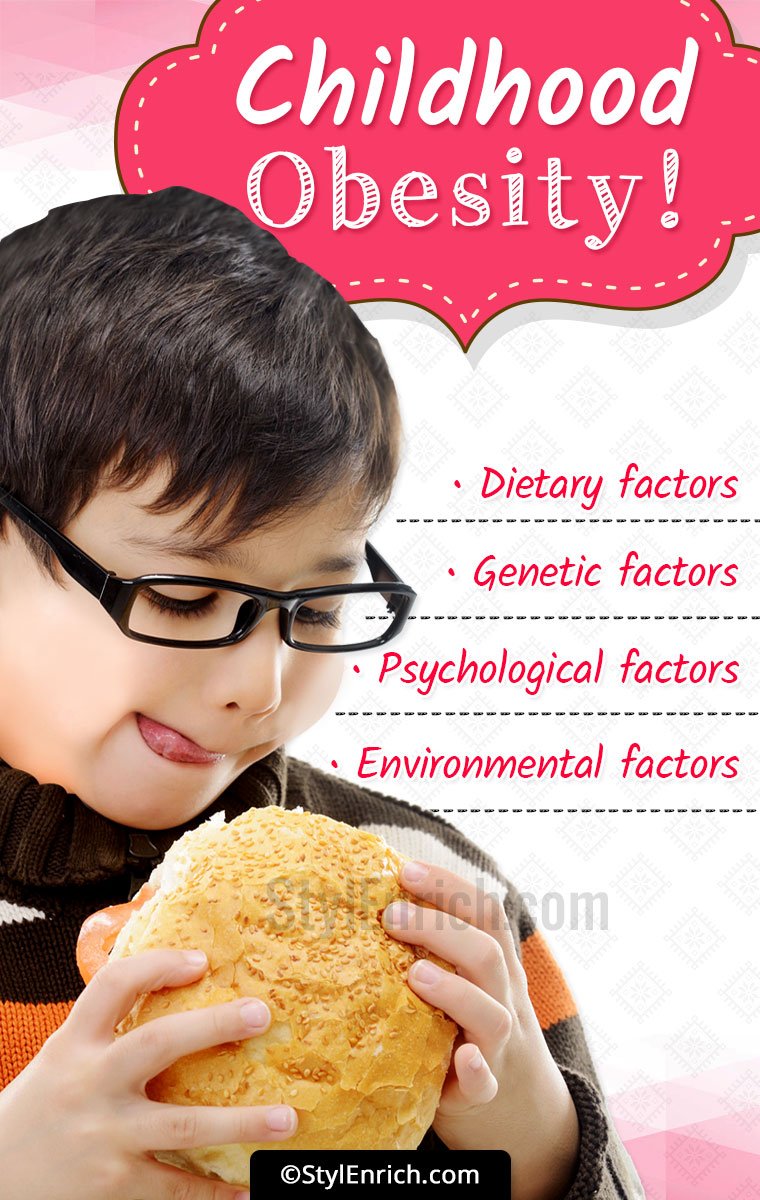Childhood obesity is a condition where the excess in body fat can affect the child’s well-being. Genetics, socioeconomic factors, family practices and hormonal imbalances are the causes of obesity. Obesity in kids can result in type 2 diabetes, high cholesterol, asthma and low HDL cholesterol. Dietary changes, physical activity and involvement of parents in child’s activity can bring a difference.
We, as parents, have always wanted to have a healthy child who would grow up to be a healthy individual. Most of us want to have chubby babies. However, it’s not healthy if your bouncy baby grows up to be an overweight adult. It’s not that all the babies who are chubby will grow up to be obese. But Kids who gain weight earlier than 5 years of age have a greater risk of being obese. The prevalence of obesity has become common and posing a serious nutritional disorder in children.
Health professionals use the growth chart to check if the kid falls in the healthy weight range according to the height, age and gender.
- Children with BMI of above 85th percentile and less than 95th percentile are considered overweight.
- Children with BMI of above 95th percentile are considered as obese.
Energy imbalance is the common key for increasing obesity in kids. If the intake of diet and beverages are more than the body needs for growth, physical activity and healthy functioning then increase in weight gain can occur. Thus as we say we need to take care of the dietary pattern and physical activity schedule of the adults we also need to take care of the diet and exercise from childhood itself. Let us know what could be the causes of obesity in kids.
The Risk Factors Contributing Towards Child Hood Obesity
Today’s lifestyle issues of having too many calories in the form of food and drinks and too little activity are the major contributors but apart from this, genetics and hormones also play an important role.
1. Genetic Factors
There is evidence that genetic inheritance influences the chances being fat. Within the family, if one of the parents is obese, there are 40% chances of a child becoming fat and if both the parents are obese, there are 80% chances and 7% chances if none of them are obese.
2. Psychological Factors
Parental, personal and family stress tends to increase the childhood obesity. Sometimes the child tends to overeat to overcome stress or to fight boredom. Kids tend to sometimes ape what parents do. Hence there is a possibility that the parents may be also doing the same thing in order to cope stress.
3. Environmental Factors
Watching television is the strongest predictor of childhood obesity. On an average, a child spends about 20 to 30 hours per week in front of TV. The more time the child spends before the TV, computer or video games, the less time he or she will get to involve more actively. Apart from that, television commercials promote eating and highly processed snacks that are calorie dense and high in sugar and fat thus influencing the kids snack preference.
4. Dietary Factors
Kids are getting easily accessible to high-calorie foods like fast foods, baked goods and vending machine snacks can cause weight gain. To add to the fire, high sugary foods like candy and desserts and sugary fruit drinks are culprits to weight gain in kids.
Complications Occurring Due To Childhood Obesity
Childhood obesity can have complications in various aspects like the physical, mental and emotional well-being.
- Obesity and the sedentary lifestyle increase the risk of type 2 diabetes.
- The poor diet increases the chances of the child developing either high blood pressure or high cholesterol or both.
- Overweight or obese kids have greater chances of developing asthma.
- Obstructive sleep apnea has been the debilitating issue in kids where the breathing stops and starts repeatedly during sleep.
- Kids tend to develop metabolic syndrome where the child can develop a cluster of conditions like heart disease, high triglyceride levels, low HDL levels, high blood sugar and increased abdominal fat.
Hence obesity is not only the alarming situation for adults but also it can affect the kids badly and negatively causing various conditions that can adversely affect life. Apart from physical complication, kids also tend to suffer from low self-esteem as they are mostly bullied by their peers leading to getting cut out and having poorer social skills. Low self-esteem leads to the feeling of hopelessness among kids who are overweight.
Prevention Better Than Cure
Prevention of childhood obesity or overweight in kids includes changes in the dietary habits of children along with physical activity. In certain cases, it also involves medication and weight loss surgery.
- Parents play an important role and teach good eating habits to kids by setting a good example in their eating behavior.
- Prevention of obesity begins early with careful supervision of feeding of infants and children. Effective nutritional counseling to mothers at the earliest can correct the problem. Overfeeding in infancy may show the mother’s inability to differentiate between fussiness and hunger in infants.
- It’s the parents who buy food, cook meals and decide what to eat for kids. Then, in that case, Stop depending on high caloric foods like cakes, cookies and fast foods that are heavy in sugar, fats and calories. Make a point to prepare healthy snacks.
- Limit the intake of sweetened beverages or fruit drink concentrates. Instead encourage your child to drink ample amount of water, fresh fruit milkshakes or smoothies that can improve the satiety value and provide nutrients.
- Do not overfeed the child. Children do not eat as much as adults. Its Ok if some times the child leave the food in the plate. Limit on the portion size when you go out to eat as the portion size of the restaurant is oversized.
- Encourage meals as a family affair time to share day to day news and family conversation. Discourage eating in front of TV or computer and video games which can lower the awareness and result in eating fast without concentrating on the food.
Apart from healthy diet, physical activity also plays an important role in maintaining the healthy weight. An active child tends to become a fit adult.
Physical Activity
Physical activity done in kids tend to burn calories, strengthen bones and muscles and stay active during the day and have a good night sleep in the night.
- Allow the kids to be moving and active. Kids may not prefer structured exercise program wherein they have to run on the tread mill or weight training. It is preferable for the kids to get involved in play activities like hide and seek, tug of war and skipping rope. These activities are fun to play and also suitable for improving fitness and burning calories.
- Limit TV and recreational computer time by encouraging the kids to get involved in activities. Kids also can join classes like football classes or cricket class or swimming which can make them fit.
- Even parents can actively be involved in kids activities. If the kids love to go for hike and for nature activities, parents should also accompany the kids and bike riding where the parents can go for long ride thus making the experience interesting and exciting.
Medications and surgery are considered to be last option if the increase in weight in kids is actually affecting their health or causing adverse effects on the body. However, it is always essential to know that the parents should be equally involved in the development of the kid. If kids have imbibed certain faulty dietary habits from the parents then it is the parents who need to change the habit and control the dietary habits. If there are issues regarding achieving ideal body weight in kids, you can always consult a nutritionist who can help you in planning the diet.


















